Sri Lanka's president flees the country
July 12, 2022
THE ASSOCIATED PRESS
People throng President Gotabaya Rajapaksa's official residence on Tuesday, three days after it was stormed by anti government protesters in Colombo, Sri Lanka.
COLOMBO, Sri Lanka — The president of Sri Lanka fled the country early Wednesday, days after protesters stormed his home and office and the official residence of his prime minister amid a three-month economic crisis that triggered severe shortages of food and fuel.
President Gotabaya Rajapaksa, his wife and two bodyguards left aboard a Sri Lankan Air Force plane bound for the city of Male, the capital of the Maldives, according to an immigration official who spoke on the condition of anonymity because of the sensitivity of the situation.
Rajapaksa had agreed to step down under pressure. Prime Minister Ranil Wickremesinghe said he would leave once a new government was in place.
Lawmakers agreed to elect a new president next week but struggled Tuesday to decide on the makeup of a new government to lift the bankrupt country out of economic and political collapse.
The promised resignations brought no end to the crisis, and protesters have vowed to occupy the official buildings until the top leaders are gone. For days, people have flocked to the presidential palace almost as if it were a tourist attraction — swimming in the pool, marveling at the paintings and lounging on the beds piled high with pillows. At one point, they also burned the prime minister's private home.
While lawmakers agreed late Monday to elect a new president from their ranks on July 20, they have not yet decided who will take over as prime minister and fill the Cabinet.
The new president will serve the remainder of Rajapaksa's term, which ends in 2024 — and could potentially appoint a new prime minister, who would then have to be approved by Parliament.
The prime minster is to serve as president until a replacement is chosen — an arrangement that is sure to further anger protesters who want Wickremesinghe out immediately.
Corruption and mismanagement have left the island nation laden with debt and unable to pay for imports of basic necessities. The shortages have sown despair among the country's 22 million people. Sri Lankans are skipping meals and lining up for hours to try to buy scarce fuel.
Until the latest crisis deepened, the Sri Lankan economy had been expanding and growing a comfortable middle class.
What lies ahead for Sri Lanka as the country faces political turmoil
The political impasse added fuel to the economic crisis since the absence of an alternative unity government threatened to delay a hoped-for bailout from the International Monetary Fund. The government must submit a plan on debt sustainability to the IMF in August before reaching an agreement.
In the meantime, the country is relying on aid from neighboring India and from China.
Asked whether China was in talks with Sri Lanka about possible loans, a Chinese Foreign Ministry official gave no indication whether such discussions were happening.
"China will continue to offer assistance as our capability allows for Sri Lanka's social development and economic recovery," said the spokesman, Wang Wenbin.
On Tuesday, Sri Lanka's religious leaders urged protesters to leave the government buildings. The protesters have vowed to wait until both Rajapaksa and Wickremesinghe are out of office.
After the storming of the government buildings, "it was clear there is a consensus in the country that the government leadership should change," said Jehan Perera, executive director of the National Peace Council of Sri Lanka, a think tank.
Months of demonstrations have all but dismantled the Rajapaksa political dynasty, which has ruled Sri Lanka for most of the past two decades.
The protesters accuse the president and his relatives of siphoning money from government coffers for years and Rajapaksa's administration of hastening the country's collapse by mismanaging the economy. The family has denied the corruption allegations, but Rajapaksa acknowledged some of his policies contributed to the meltdown.
The president had not been seen nor heard from since Saturday, though his office issued statements indicating that he continued to carry out his duties.
BREAKING – India refuses to let Sri Lankan president land in air force jet
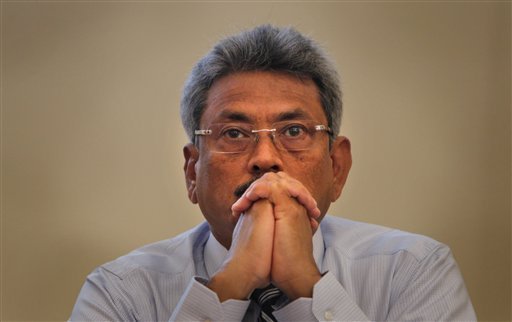
The Indian government has refused to let Sri Lanka’s Gotabaya Rajapaksa land at a civilian airport in the country using an air force jet reports SBS Sinhala, as the embattled president reportedly searches for a way to flee the island.
According the SBS, “the Indian government refused to allow a Sri Lankan air force AN32, carrying the president, to land at an Indian civilian airport”.
Read more from SBS here.
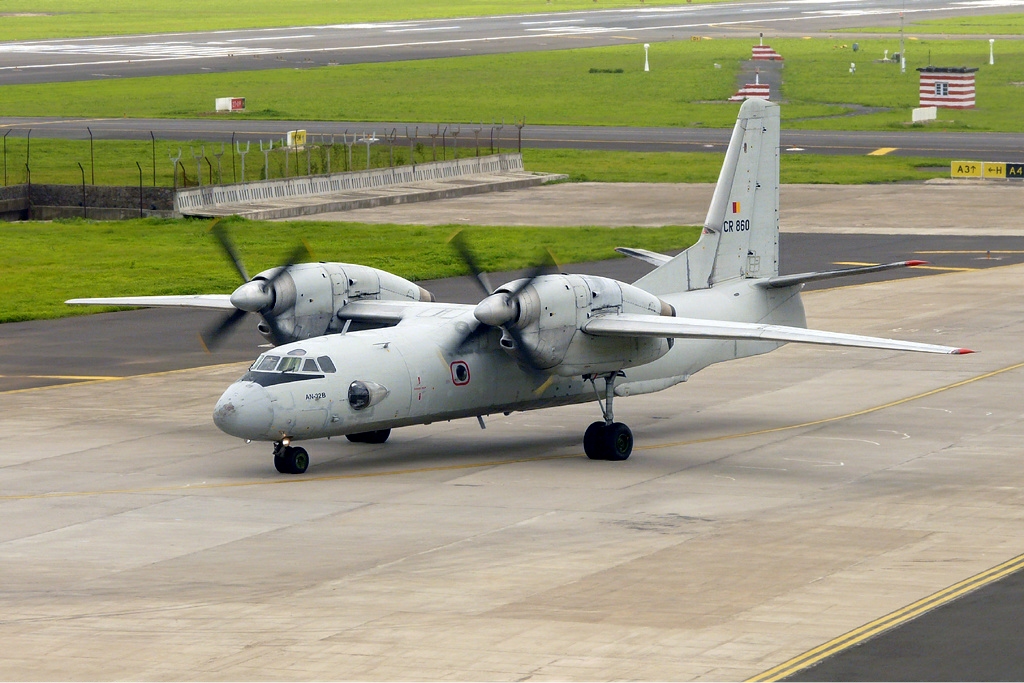
A Sri Lankan Air Force Antonov 32, the aircraft Rajapaksa was reportedly attempting to flee in (Courtesy: Sean d'Silva).
The news follows reports that the US embassy in Colombo denied Rajapaksa a visitor’s visa to enter the country.
“It was made very clear to him that there will be no visa for him,” a representative from the US embassy in Colombo reportedly told SBS Sinhala.
Read more: US denies visa to Gotabaya Rajapaksa
The Sri Lankan president and his brother, former finance minister Basil Rajapaksa, both attempted to flee the island via air last night, but were hindered by angry locals and airport staff who refused to serve them.
The whereabouts of both men remain unknown.
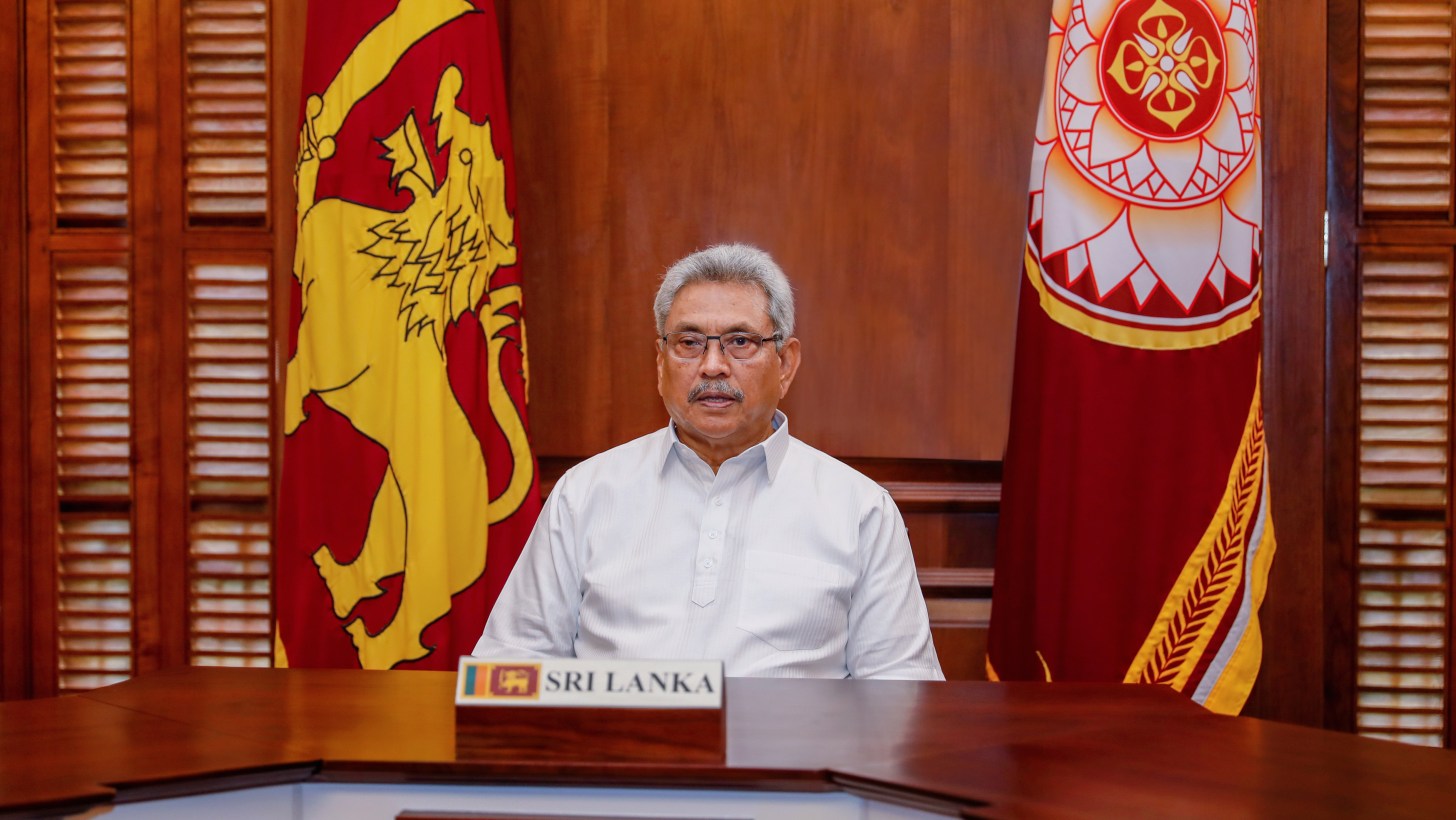
The US embassy has reportedly denied embattled Sri Lankan president Gotabaya Rajapaksa a visitor's visa to enter the country, after reports that he attempted to flee the island last night.
“It was made very clear to him that there will be no visa for him,” a representative from the US embassy in Colombo reportedly told SBS Sinhala.
Rajapaksa had reportedly requested a visitor visa to travel to California over the weekend. The request was refused.
“He could go there as a head of state without a visa, but the current circumstances are different,” the embassy representative said.
“He sought a safe passage to the U.S. after the recent events, but it was denied,” a Colombo-based US Embassy official also told The Hindu on Tuesday.
However, SBS reports, the US embassy in Colombo did issue a new US passport to his brother Basil Rajapaksa, who reportedly left his in the presidential residence, which was stormed by protestors on Saturday.
Basil Rajapaksa, the former finance minister of Sri Lanka, also reportedly attempted to flee the island last night. The sibling, once nicknamed “Mr Ten Percent” over his reputation to demand a 10% bribe for any project, was reportedly attempting to board a flight to Dubai, and then travel to the United States where he still holds dual citizenship.
Both men were hindered by angry locals and airport staff who refused to serve them.
By Uditha Jayasinghe and Devjyot Ghoshal
07/12/22

Sri Lankan immigration officials stopped the president's brother and former finance minister Basil Rajapaksa from flying out of the country on Tuesday, as anger mounted over the island's worst economic crisis in decades.
It was not clear where Rajapaksa, who also holds U.S. citizenship, was trying to go. He resigned as finance minister in early April as street protests surged against shortages of fuel, food and other necessities, and quit his seat in parliament in June.
His elder brother, Gotabaya Rajapaksa, will resign as president on Wednesday to make way for a unity government, after thousands of protesters stormed his and the prime minister's official residences on Saturday demanding their ouster.
The president has not been seen in public since Friday and his whereabouts are unclear. Parliament will elect his replacement on July 20.
The main opposition party has nominated its leader, Sajith Premadasa, the son of an assassinated president, for the post. The ruling party is to decide on a nominee later in the day.
The Sri Lanka Immigration and Emigration Officers Association said its members declined to serve Basil Rajapaksa at the VIP departure lounge at Colombo airport.
"Given the unrest in Sri Lanka, immigration officials are under tremendous pressure to not allow top-level people to leave the country," K.A.S. Kanugala, chairman of the association, told Reuters.
"We are concerned for our security. So until this issue is resolved, the immigration officials working at the VIP lounge decided to withdraw their services."
Pictures of Basil Rajapaksa at the lounge were carried by local media and widely shared on social media, with some people expressing anger at his attempts to flee. Basil Rajapaksa could not be immediately reached for comment and a close aide declined to give details.
A top official in the ruling party said on condition of anonymity that Basil Rajapaksa was still in the country.
The Rajapaksa family, including former Prime Minister Mahinda Rajapaksa, has dominated the politics of the country of 22 million for years and most Sri Lankans blame them for their current misery. Police have said that if a court ordered, they could investigate how about $50,000 in cash was found by protesters at the president's house.
'FREEDOM'
U.S. Treasury Secretary Janet Yellen said during a visit to Tokyo that Sri Lanka was in a "very difficult situation" and that one of its main debt holders, China, had an important role to play.
China is Sri Lanka's fourth-biggest lender, behind international financial markets, the Asian Development Bank and Japan.
In recent months, neighbour India has extended billions of dollars in loans to Sri Lanka to help pay for vital supplies. China has intervened less publicly but said it supports efforts for the island nation to restructure its debt.
The tourism-dependent economy was hammered badly by the COVID-19 pandemic and a fall in remittances from overseas Sri Lankans, while a ban on chemical fertilisers damaged farm output. The ban was later reversed.
The Rajapaksas implemented populist tax cuts in 2019 that affected government finances while shrinking foreign reserves curtailed imports of fuel, food and medicines.
Petrol has been severely rationed and long lines have formed in front of shops selling cooking gas. Headline inflation hit 54.6% last month, and the central bank has warned that it could rise to 70% in coming months.
Sri Lanka's sovereign dollar bonds extended recent declines on Tuesday to touch record lows. The 2025 bond suffered the biggest losses, down as much as 1.125 cents with bonds trading between 25-27 cents on the dollar, Tradeweb data showed.
Protesters have vowed to stay put in the official residences of the president and the prime minister until they quit. Prime Minister Ranil Wickremesinghe did not move into his official residence, Temple Trees, after taking office in May, and was away when protesters set fire to his private home in Colombo on Saturday.
On Tuesday, seven people were hospitalised after a fight between two groups of protesters at Temple Trees, police spokesman Nalin Thalduwa told Reuters. It was not immediately clear what led to the fight.
A witness, who declined to be named, described it as a small incident.
The mood was festive at the airy colonial-era building, once one of the country's most protected with armed guards and watch-towers.
Several hundred people walked through its stately rooms while a young man in a baseball cap played a grand piano by a large porch, onlookers clapping along. Families with young children picnicked on the lawns, and a vendor walked through, selling lottery tickets.
At one guard box, two paramilitary soldiers with assault rifles stood by as sightseers streamed out of a waiting room after taking photographs of themselves sitting on the carved high-backed chairs.
"Freedom!" said Mallawaara Arachchi, a 73-year-old retired engineer touring the building. "What we expected we have gained. We will be the best country in the world in the near future."
(Writing by Krishna N. Das; Editing by Raju Gopalakrishnan and Nick Macfie)

COLOMBO (AFP) - Sri Lanka's embattled president was stuck in his own country on Tuesday (July 12) in a humiliating stand-off with airport immigration staff blocking his exit to safety abroad, official sources said on Tuesday.
Gotabaya Rajapaksa has promised to resign on Wednesday and clear the way for a "peaceful transition of power" following widespread protests against him over the country's unprecedented economic crisis.
The 73-year-old leader fled his official residence in Colombo just before tens of thousands of protesters overran it on Saturday and wanted to travel to Dubai, officials said.
As president, Rajapaksa enjoys immunity from arrest, and he is believed to want to go abroad before stepping down to avoid the possibility of being detained.
But immigration officers were refusing to go to the VIP suite to stamp his passport, while he insisted he would not go through the public facilities fearing reprisals from other airport users.
The president and his wife spent the night at a military base next to the main international airport after missing four flights that could have taken them to the United Arab Emirates.
Rajapaksa's youngest brother Basil, who resigned in April as finance minister, missed his own Emirates flight to Dubai early on Tuesday after a similar stand-off with airport staff.
Basil tried to use the paid concierge service for business travellers, but airport and immigration staff said they were withdrawing from the fast track service with immediate effect.
"There were some other passengers who protested against Basil boarding their flight," an airport official said. "It was a tense situation, so he hurriedly left the airport."
Basil, a US dual citizen, had to obtain a new passport after leaving his behind at the presidential palace when the Rajapaksas beat a hasty retreat to avoid mobs on Saturday, a diplomatic source said.
Hasty retreat
Official sources said a suitcase full of documents had also been left behind at the stately mansion along with 17.85 million rupees (S$69,300) in cash, now in the custody of a Colombo court.
There was no official word from the president's office about his whereabouts, but he remained commander-in-chief of the armed forces with military resources at his disposal.
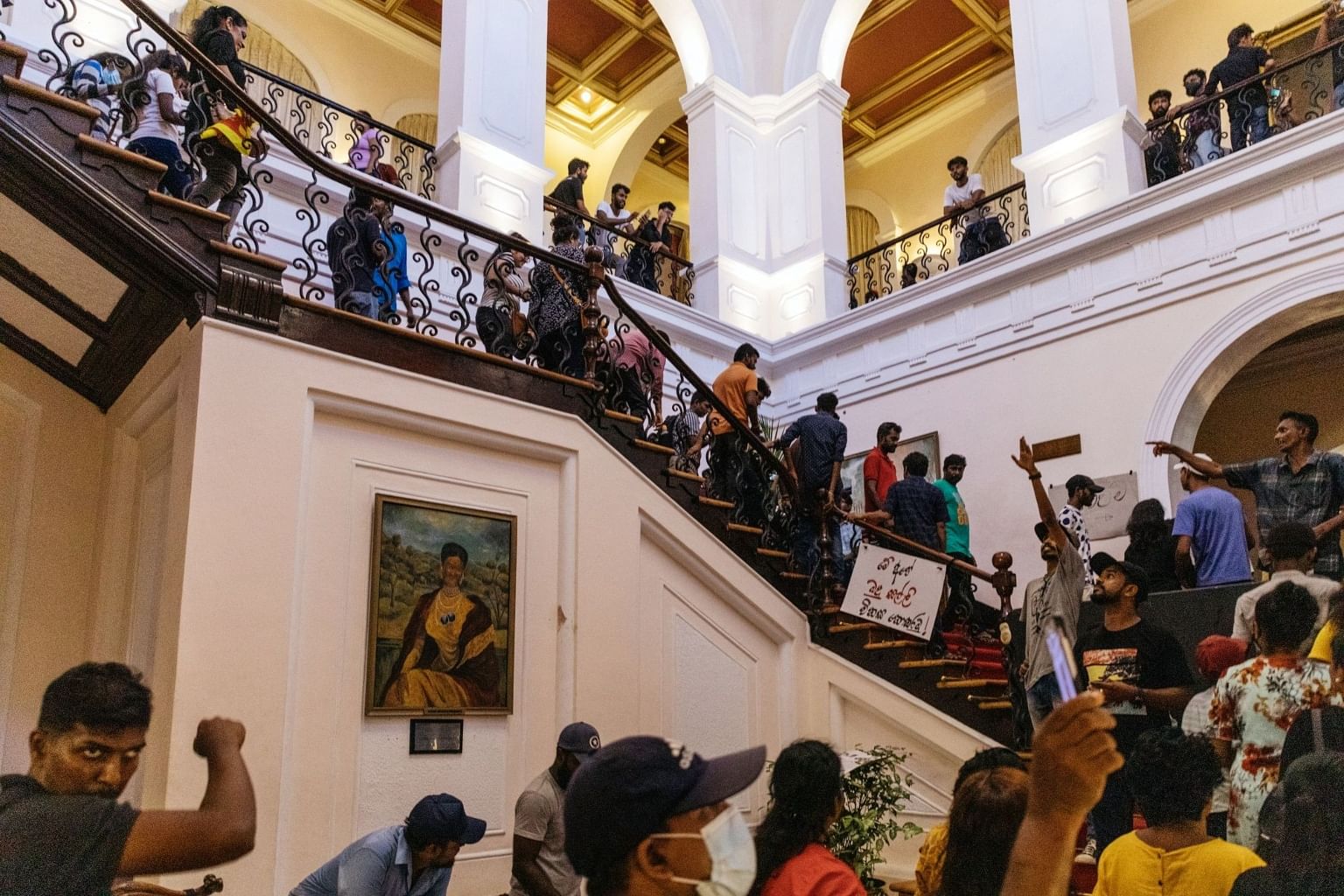
One option still open to him would be to take a navy vessel to either India or the Maldives, a defence source said.
If Rajapaksa steps down as promised, Prime Minister Ranil Wickremesinghe will automatically become acting president until parliament elects an MP to serve out the presidential term, which ends in November 2024.
Rajapaksa is accused of mismanaging the economy to a point where the country has run out of foreign exchange to finance even the most essential imports, leading to severe hardships for the 22 million population.
Sri Lanka defaulted on its US$51-billion foreign debt in April and is in talks with the IMF for a possible bailout.
The island has nearly exhausted its already scarce supplies of petrol. The government has ordered the closure of non-essential offices and schools to reduce commuting and save fuel.
“Gota” is finally gone, but ending Sri Lanka’s chronic instability will be an even harder task than ousting the Rajapaksas.
By P.K. Balachandran
July 12, 2022
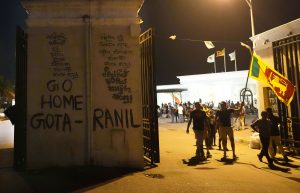
Protesters walk past a vandalized security gate at the entrance to president’s official residence in Colombo, Sri Lanka, Saturday, July 9, 2022.
Mobs have ended the Gotabaya Rajapaksa-Ranil Wickremesinghe government in Sri Lanka. On Saturday, huge crowds of angry youth stormed the official residences of the president and the prime minister and set fire to the private residence of Wickremesinghe, forcing the hands of the two leaders.
Both President Gotabaya Rajapaksa and Prime Minister Ranil Wickremesinghe have declared their intention to resign. While the president said that he would quit on July 13, the prime minister said that he would quit as soon as the proposed all-party government is formed.
Sri Lankans are amazed that the discredited duo is still sticking in office despite their manifest alienation from the masses.
Meanwhile, a meeting of all parliamentary parties called by the speaker, Mahinda Yapa Abeywardena, had demanded the resignation of the president and the prime minister and proposed that the speaker take charge as interim president for a maximum of 30 days. Within that time, parliament should elect a president to complete Rajapaksa’s term.
The party leaders rejected Wickremesinghe’s plea that he be allowed to complete critical talks with the International Monetary Fund (IMF) for a bailout package and secure fuel supplies from various countries. His ministers declined to speak up for him; some declared their intention to resign.
The mob violence was unprecedented because it was the first time that mass anger was directed against the top rulers of the country and not a minority community, such as Tamils or Muslims.
The police and fire services watched as thousands broke iron barricades and occupied the president’s colonial-era mansion and the prime minister’s official residence. Later in the night, the mob set fire to the prime minister’s private residence, destroying hundreds of books, antiques, and paintings collected by Wickremesinghe and his wife, both aesthetes.
It looked as if the Sri Lankan state machinery had crumbled under the weight of the agitators’ numbers as well as the public support they enjoyed. The island nation’s citizens, suffering for months for want of basic necessities like food, fuel, and medicines, had tacitly sanctioned destruction and arson directed against political leaders, who were collectively derided as “rogues” who deserved no better.ADVERTISEMENT
However, neither Rajapaksa nor Wickremesinghe was in residence at the time of the attacks, having been evacuated to unknown safe houses by the military.
The Build-up
By Saturday, it was obvious to Rajapaksa that the political situation had turned against him irreversibly. The opposition was to organize a huge rally on Saturday in front of his official residence. The first sign of the collapse of the system appeared when the courts refused a police request to ban rallies near the president’s house. The curfew that the police had instituted on Friday was lifted at 8 a.m. on Saturday on the demand of the Bar Council of Sri Lanka. Trains and buses, which were not supposed to run on Saturday, did run, bringing thousands of agitators to Colombo.
The police, who resisted the marchers initially, eventually gave in and allowed the crowd to storm the president’s and the prime minister’s official residences and then attack Wickremesinghe’s personal residence. The army also decided not to act, apparently because officials from Western nations, especially U.S. Ambassador Julie Chung, had warned against the use of force against “peaceful” demonstrators.
Above all, several members of the ruling coalition led by the Sri Lanka Podujana Peramuna (SLPP) demanded the resignation of the president. It looked as if Rajapaksa had no legs to stand on. His support structure, comprising the ruling party and its coalition partners, the law and order machinery, and the courts, had collapsed. Public forces like the “Gota Go Home” agitators, lawyers, Catholic, Protestant and Buddhist clergy members, prominent Muslim leaders, and trade unions were now calling the shots.
The Rise and Fall of Gotabaya
Gotabaya Rajapaksa is the younger brother of former President and SLPP supremo Mahinda Rajapaksa. When Mahinda came to power in 2005 on an anti-separatist and Sinhalese-nationalist platform and decided to go to war with the separatist Tamil Tigers in 2006, Gotabaya, a retired lieutenant colonel of the Sri Lankan army, came back from the United States to take charge as defense secretary. After winning the war he shone as secretary of the urban development ministry.
Mahinda was voted out of office in 2015, but the family did not remain sidelined for long.
In August 2019, a series of suicide attacks by Islamic terrorists created a new wave of Sinhalese-Buddhist majoritarian nationalism, which demanded a strong leader. The SLPP and its nationalist allies put up Gotabaya Rajapaksa as their presidential candidate in 2019 on the strength of his war-winning ways. He swept the elections.
But the moment he took office, Gotabaya started replacing civilian officials with retired military officers in key posts, causing dismay in the civil service. He cared little for ministers and members of parliament, as he believed that professional politicians were lazy, inefficient, and corrupt. Thus, he alienated the entire political class, including his own party men. Even experienced men in the politically savvy Rajapaksa clan could not disabuse him of his notions.
Gotabaya’s initial actions were populist but at the cost of the treasury. He announced tax cuts, which reduced revenue. He recruited 100,000 unemployable university graduates to petty government jobs, which drained the state’s resources. He also went against the Muslim minority, seeing them as terrorists or jihadists.
When the COVID-19 pandemic hit Sri Lanka, he ordered frequent lockdowns. The economy ground to a halt. Export income and customs duties plummeted. Tourist arrivals fell to a trickle because of expensive quarantine regulations. Remittances from citizens working abroad also thinned. On top of all that, Rajapaksa suddenly slapped a total ban on chemical fertilizers and pesticides, which ruined the agriculture sector, affecting 70 percent of the population.
While the import-dependent country was facing a dollar crunch, the time came for paying foreign loan installments. In 2022, Sri Lanka had to pay $7 billion in debts when it had only a little over $1 billion in foreign exchange reserves. In April, Sri Lanka defaulted on loan repayments and sought restructuring of the repayment regimen. Afraid of the IMF’s conditions, the government delayed an appeal to the IMF for a bailout. When Colombo did approach the IMF, the country was down to the dregs, surviving on handouts from India, which between January and June totaled $3.5 billion.
Depending entirely on Indian lines of credit, the government was unable to meet even the basic expectations of the people: fuel for their vehicles, food on the table, and medicines in state hospitals. Food inflation had hit 56 percent.
Restive Sri Lankans, mostly the youth, had by then started the “Gota Go Home” movement, brazenly blocking the main entrance of the president’s office. The round-the-clock agitation continued for weeks, with the agitators demanding the ouster of the entire Rajapaksa clan. A violent attack perpetrated by Prime Minister Mahinda Rajapaksa’s followers on peaceful “Go Home Gota” agitators on May 9 led to Mahinda’s resignation. But even after this, agitators burnt the houses of the Rajapaksas and 60 other ruling party honchos in the districts.
Enter (and Exit) Wickremesinghe
Following the resignation of Mahinda, there was a vociferous demand that an all-party government be formed. The president asked the leader of the opposition, Sajith Premadasa, to form a government, but Premadasa said that the president should resign first, a condition Gotabaya rejected. He then asked Ranil Wickremesinghe to assume office as prime minister. Wickremesinghe took up the job on the condition that he be given a free hand, to which Gotabaya agreed.
Meanwhile, the peoples’ woes continued as India had reached the end of its tether as far as giving credit went. It was clear that debt restructuring would take time and the IMF’s bailout package, which was tied to debt restructuring, was not expected anytime soon. Most Sri Lankans and the politicians in parliament were of the view that a change of government, with the exit of Gotabaya Rajapaksa as well as Wickremesinghe, would help.
The common demand was for an all-party government and not a patchwork under Wickremesinghe, whose political legitimacy was questioned because he was not an elected MP but a nominated one. He represents the United National Party (UNP), which did not have a single elected MP. That Wickremesinghe had the support of the president and the SLPP, the single largest party in parliament, did not matter. He was seen as a “lackey” of the hated Rajapaksas.
People blindly felt that nothing good could be achieved unless Rajapaksa and Wickremesinghe quit. When the duo did not go but kept saying that they could turn the country around, the agitators decided to abandon non-violence and force the issue.
Sri Lanka’s future is now extremely uncertain. The formation of an all-party government will be difficult because the parties in parliament are an extremely disparate lot, each in stiff competition with the other. There is no standout leader to rally the various groups under one umbrella. Given the instability, the IMF package will be delayed, foreign aid may cease, and foreign investment will not come.
In other words, the ouster of Rajapaksa and Wickremesinghe is not the end of Sri Lanka’s woes. It may in fact usher in an even more acute crisis in the coming weeks.
GUEST AUTHOR
P.K. Balachandran is an experienced Indian journalist writing on South Asian affairs from his base in Colombo, Sri Lanka. He has written for a number of prestigious publications including The Guardian, The Observer, and the Economist.
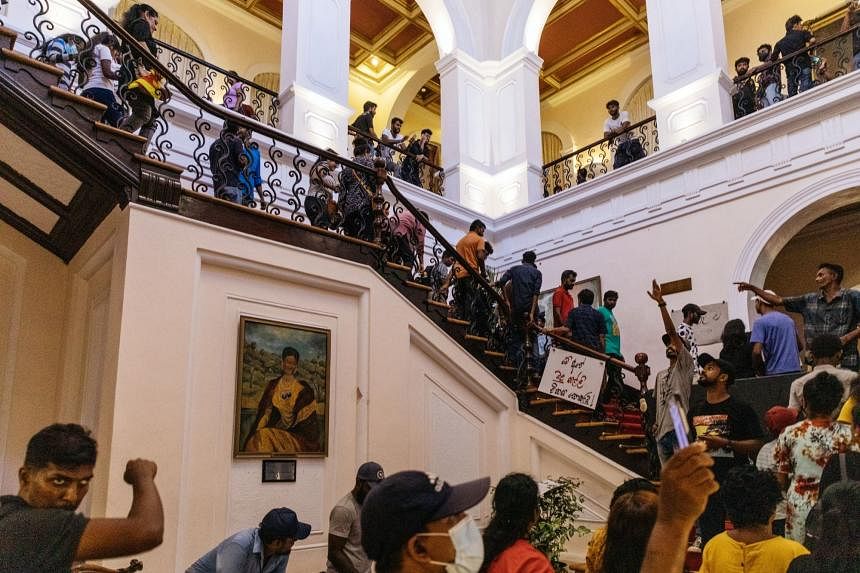
COLOMBO Sri Lanka's Parliament will elect a new president on July 20, its speaker said on Monday (July 11), after protesters stormed the residences of the current president and prime minister. Here are some key dates
July 9
Sri Lankan President Gotabaya Rajapaksa and Prime Minister Ranil Wickremesinghe announce their resignations.
July 13
Mr Rajapaksa will officially step down. Analysts and observers told CNN Parliament Speaker Mahinda Yapa Abeywardena will likely assume temporary charge.
July 15
Parliament to reconvene.
July 19
Nominations for the top post will be presented before Parliament starting July 19.
July 20
New president to be elected and will complete the rest of Mr Rajapaksa's term, due to end in 2024.
No comments:
Post a Comment